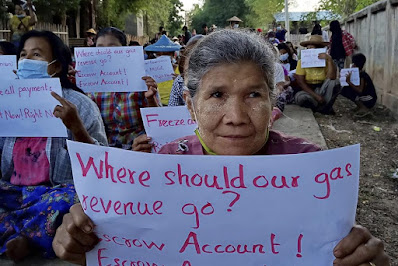Pope Francis states, in Laudato Si that “the world is a gift which we have freely received and must share with others. Since the world has been given to us, we can no longer view reality in a purely utilitarian way, in which efficiency and productivity are entirely geared to our individual benefit.” In fact some people are privileged to enjoy world natural resources whereas others have no access to it. Are world natural resources truly shared? This short article portrays roughly how natural resources are shared in Myanmar.
Myanmar is a country endowed with rich natural resources. The forest is one of the rich natural resources. Myanmar is also known to be homeland to the best quality of teak, which is one of the most valued tropical timbers in the world. Companies that owned by military generals take control of exporting precious teak and timbers. It is illegal for civilians to cut these precious woods. The profit gained from this kind of natural resource goes to the military pocket and be used to strengthen the military power.
There are several mining areas in Myanmar. Precious gemstone-jade, ruby and many other- are known to come from the country. Most mining are located in northern part of the country. Once again, the military government take full control of these mining, they run these mining business and also grant concession to some companies from China. Mining operation benefits military government solely while its civilian does not have a share in it at all.
Myanmar also has natural resources such as gas and oil. The military government also takes control of these operations. It exports oil and gas to China and Thailand. Most of the natural resources mentioned above profit mainly the military while civilians have no share in these natural resources.
Myanmar is an agricultural country. The country has three principal agroecological zones: delta and coastal zone, the dry zone, and the hill zone. Rice and fish production are predominant in the delta and coastal zone as there is plentiful monsoon rain and accessible water. In the dry zone, agriculture is in the river valleys where rice and crops are the main products and irrigation is the major system of agriculture. Most ordinary civilians are farmers, they own small piece of land where they can make their living by growing rice and other plants. Citizens living on mountain appropriate pieces of land to grow crops and rice to make their living.
The sole profiteer of the country natural resources is the military that rules the country. Only some civilians have their sharing in the factor of agriculture. The military has no desire of losing control of these natural resources and it tries to suppress any of its opposite party by the use of military power. This unjust control of the natural resources by military is one of the factors that contributes to the political conflicts in the country.
Myanmar has unique ethnic diversity, multi-religion and multi-cultural diversity. The majority of population is known to be Burmese whereas Kachin, Kayah, Kayin, Chin, Shan, Mon and Rakhine are considered to be the different ethnic minorities. There are many armed groups within these different ethnic minorities that want to defend their freedom and their right to natural resources.
Unjust sharing of natural resources disturbs stability and peace of community. One of the reasons that political conflict in the country is that the military wants take control over the ethnic minorities and their right to natural resources. Ethnic minorities should have a share in the natural resources in their perspective region as Pope Francis stated above. If this is not the case, it is impossible to establish stability and peace in the country.


No hay comentarios:
Publicar un comentario